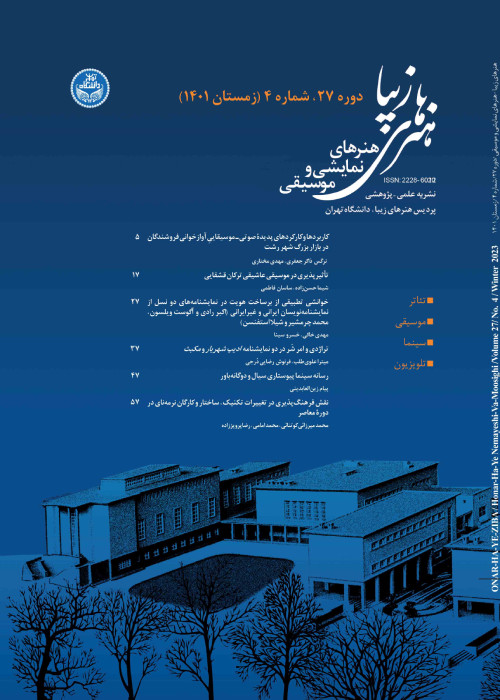‘Existential Tragedy’ in Lord Byron’s ‘Manfred’
Author(s):
Article Type:
Research/Original Article (دارای رتبه معتبر)
Abstract:
Existentialists considered existence as a tragedy, and believed that humans could never escape this dilemma. They had a cold, bitter, and nihilistic look towards life; that humans are alone in this world and should take responsibility for everything by themselves. They believed that humans have no shelter and are in motion towards death from the moment of birth; and knowing this fact is horrific and puts them in crisis. "Existential tragedy" is formed in this situation. In fact, the "existential tragedy" is equal to the tragedy of a shelter-less lonely human that is pulled step by step towards nothingness, and the awareness of his position in the universe becomes subject to anxiety and stress. A century earlier, romantics also saw life as cynical, absurd and fanciful, and felt alienated to their surroundings. Because of this similar attitude, the scholars of existentialism are widely influenced by romanticism and believe that they have borrowed part of their discourse from them, so that one must search in works of romantics to find the root of the basic concepts of existentialism. The purpose of this comparative study is to investigate the similarities of existentialism and romanticism movements, centered on the concept of "existential tragedy". The present study examines the basic elements of this tragedy, "fear and anxiety," "alienation and self-alienation," and” nihilism and emptiness," in the “Manfred” play and the romanticism period with a historical-analytical approach. The “Manfred” play is about a brilliant, intelligent, and powerful person who lives with a guilty conscience due to an unspeakable sin in his palace in the Alps. He seeks help from the six spirits who rule nature and also the spirit of fate to help him forget, but none can do it. Manfred is cursed forever. After he realizes that the Alpine wizard can’t help him, he goes to infernal forces of the devil. The devil accepts his request, and summons Astarte; Manfred's dead beloved. Astartetells Manfred that his suffering will end soon. Then, Manfred awaits death calmly. Manfred is the story of an anxious and socially-alienated human that seeks freedom and peace disregarding religion. The result of the research shows that the elements of existential tragedy, namely anxiety, alienation and nihilism, clearly exist in the Manfred play and form the basis of this romantic-Byronic tragedy: Manfred's fear and anxiety come from an obscure and mysterious force and there is no way for him to escape from it. Like other romantics, he is lonely and self-alienated, and this loneliness indicates his awareness of the nature of life and its meaninglessness. Manfred's state represents the existential crisis of existentialists; a state of anxiety that is rooted in the awareness of the emptiness of existence and the shelter-less human. There are also some signs of nihilism in Manfred’s behavior, since he does not receive help from the bishop and confronts the devil on his own. The relative nihilism of romanticism in its development evolves into the more obvious nihilism of existentialists.
Keywords:
Language:
Persian
Published:
Honar-Ha-Ye-Ziba: Honar-Ha-Ye Mosighi Va Namayeshi, Volume:24 Issue: 63, 2019
Pages:
27 to 36
magiran.com/p2047220
دانلود و مطالعه متن این مقاله با یکی از روشهای زیر امکان پذیر است:
اشتراک شخصی
با عضویت و پرداخت آنلاین حق اشتراک یکساله به مبلغ 1,390,000ريال میتوانید 70 عنوان مطلب دانلود کنید!
اشتراک سازمانی
به کتابخانه دانشگاه یا محل کار خود پیشنهاد کنید تا اشتراک سازمانی این پایگاه را برای دسترسی نامحدود همه کاربران به متن مطالب تهیه نمایند!
توجه!
- حق عضویت دریافتی صرف حمایت از نشریات عضو و نگهداری، تکمیل و توسعه مگیران میشود.
- پرداخت حق اشتراک و دانلود مقالات اجازه بازنشر آن در سایر رسانههای چاپی و دیجیتال را به کاربر نمیدهد.
دسترسی سراسری کاربران دانشگاه پیام نور!
اعضای هیئت علمی و دانشجویان دانشگاه پیام نور در سراسر کشور، در صورت ثبت نام با ایمیل دانشگاهی، تا پایان فروردین ماه 1403 به مقالات سایت دسترسی خواهند داشت!
In order to view content subscription is required
Personal subscription
Subscribe magiran.com for 70 € euros via PayPal and download 70 articles during a year.
Organization subscription
Please contact us to subscribe your university or library for unlimited access!


